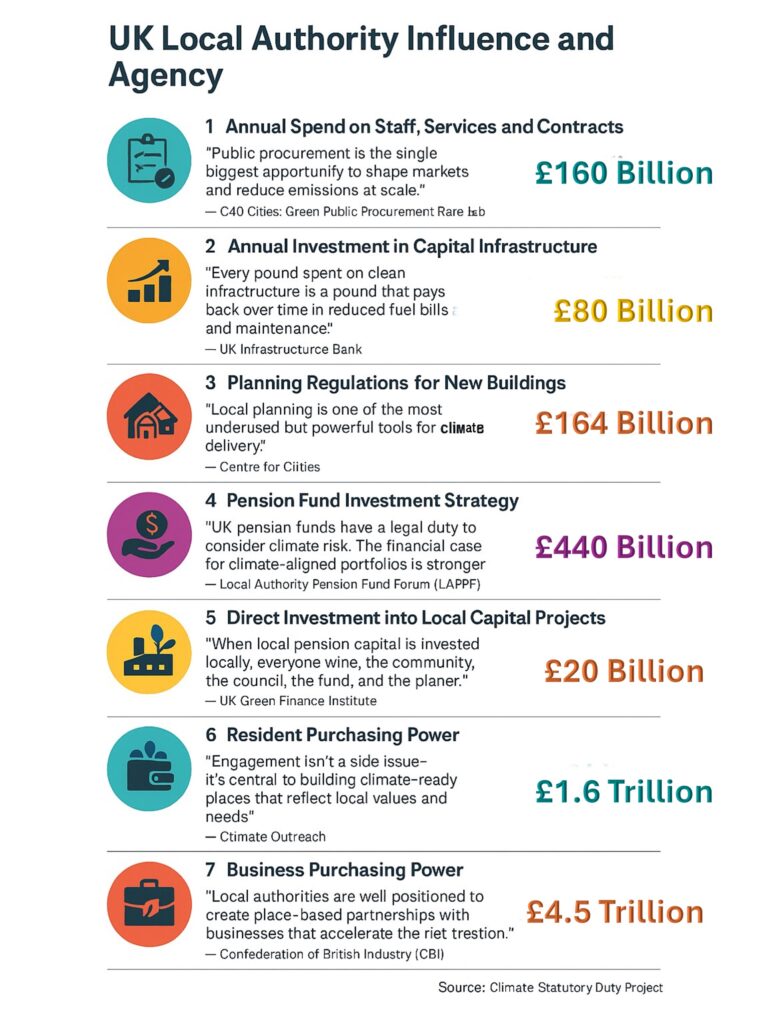

Local authorities are poised to play one of the most powerful roles in the UK’s climate transition—not only as policy-makers, but as economic engines capable of reshaping the future.
From how they spend and invest, to how they regulate and convene their communities, councils influence billions of pounds in decisions every year. In doing so, they can generate long-term savings, attract inward investment, increase property value, improve health outcomes, and accelerate the UK’s journey to net zero.
The Royal Borough of Windsor and Maidenhead (RBWM) offers a compelling microcosm of this potential. Despite its modest size, only 150,000 residents and a low Band D Council Tax of £1,769.17, this small, poorly funded authority has economic influence over:
Now, scale that across the UK’s 398 local authorities and the collective influence becomes extraordinary:
This is not only a toolkit for transformation—it is a springboard for leadership.

Let's explore how this small authority, or any authority can help propel change locally, nationally and internationally
1. Annual Spend on Staff, Services and Contracts
How to Achieve:
“Public procurement is the single biggest opportunity to shape markets and reduce emissions at scale.”
— C40 Cities: Green Public Procurement Resource Hub
2. Annual Investment in Capital Infrastructure
How to Achieve:
“Every pound spent on clean infrastructure is a pound that pays back over time in reduced fuel bills and maintenance.”
— UK Infrastructure Bank
3. Planning Regulations for New Buildings
How to Achieve:
“Local planning is one of the most underused but powerful tools for climate delivery.”
— Centre for Cities
4. Pension Fund Investment Strategy
How to Achieve:
“UK pension funds have a legal duty to consider climate risk. The financial case for climate-aligned portfolios is stronger than ever.”
— Local Authority Pension Fund Forum (LAPFF)
5. Direct Investment into Local Capital Projects
How to Achieve:
“When local pension capital is invested locally, everyone wins: the community, the council, the fund, and the planet.”
— UK Green Finance Institute
6. Resident Purchasing Power
How to Achieve:
“Engagement isn’t a side issue—it’s central to building climate-ready places that reflect local values and needs.”
— Climate Outreach
7. Business Purchasing Power
How to Achieve:
“Local authorities are well positioned to create place-based partnerships with businesses that accelerate the net-zero transition.”
— Confederation of British Industry (CBI)
To fully realise this opportunity, councils need a clear mandate and a supportive framework.
That’s why the Local Government Association is co-developing a Climate Statutory Duty—to be proposed to government this summer. This duty will give local authorities the confidence, clarity, and capacity to:
“A well-designed statutory duty won’t constrain—it will empower, accelerate and legitimise bold leadership at the local level.”
— Dr. Rebecca Willis, Lancaster University
The road to net zero will be shaped by those who act boldly, collaborate widely, and invest wisely. Local authorities have already proven themselves as hubs of innovation and integrity. Now, by using the full scope of their economic power, they can lead the way again.
As a leader—elected or executive—your choices matter. They shape not just services, but futures. The opportunity is clear. The tools are available. The support is growing.
Now is the time to step forward—to explore, to shape, and to deliver a resilient and prosperous legacy for generations to come.
Cllr. Wisdom Da Costa

Wisdom’s LinkedIn profile indicates that he is an Accountant, Corporate Treasurer, Politician, Activist locally and with Climate Change. He has spent time as a Trustee of a number of different DB, DC and LGPS Funds and currently on the Commercial Advisory Board of the Local Government Association. He is a Councillor in Windsor at the Royal Borough of Windsor and Maidenhead.
Achieving Maximum Impact on Net Zero
Tell us your views on "How Local Authorities Can Achieve Maximum Impact on Net Zero?" - Click and respond to Question 1 on this page
Issues that should be addressed
Tell us your views on "What Critical Issues a Climate Statutory Duty Should Address?" - Scroll down page to Question 2
Creating solution for local authorities
We want to create solutions for local authorities. Tell us what problems you are experiencing and, we will find solutions. Click here
